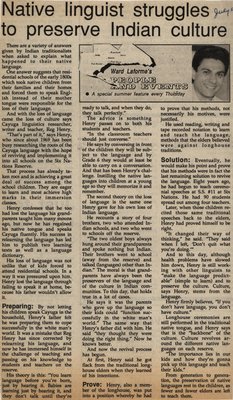"Native Linguist Struggles to Preserve Indian Culture"
- Full Text
- Native linguist struggles to preserve Indian culture
There are a variety of answers given by Indian traditionalists when asked to explain what happened to their native language.
One answer suggests that residential schools of the early 1800s which took native children from their families and their homes and force them to speak English instead of their mother tongue were responsible for the loss of their language.
And with the loss of language came the loss of culture says Cayuga linguistics researcher, writer and teacher, Reg Henry.
"That's part of it," says Henry, who since about 1969 has been researching the roots of the Cayuga language with the hope of reviving and implementing it into all schools on the Six Nations Reserve.
That process has already taken root and is achieving a great deal of success among the school children. They are eager to learn and most achieve high marks in their immersion classes.
Henry confesses that he too had lost the language his grandparents taught him many moons ago, but now he has regained his native tongue and speaks Cayuga fluently. His success in relearning the language has led him to publish two learning texts as well as a language dictionary.
His loss of language was not unlike that of kids forced to attend residential schools. In a way it was pressured upon him. Henry lost the language through failing to speak it at home, because his father wouldn't allow it.
Preparing: By not letting his children speak Cayuga in the household, Henry's father felt he was preparing them to cope successfully in the white man's world. It was a mistake that Reg Henry has since corrected by relearning his language, and now he has immersed himself in the challenge of teaching and passing on his knowledge to students and teachers on the reserve.His theory is this: "You learn language before you're born, just by hearing it. Babies are learning just by hearing it, and they don't talk until they're ready to talk, and when they do, they talk perfectly."
The advice is something Henry passes on to both his students and teachers.
"In the classroom teachers should just converse."
He says by conversing in front of the children they will be subject to the language and by Grade 6 they would at least be able to carry on a conversation. And that has been Henry's challenge. Instilling the native languages into children at a young age so they will memorize it and remember.
The second theory on the loss of language is the same one Henry gave for his own loss of Indian language.
He recounts a story of four brothers, two who attended Indian schools, and two who went to schools off the reserve.
"The two oldest boys always hung around their grandparents and spoke nothing but Indian. Their brothers went to school (away from the reserve) and talked (languages) other than Indian." The moral is that grandparents have always been the preservers of the language and of the culture in Indian communities. To this day, that holds true in a lot of cases.
He says it was the parents who gave up the language so their kids could "function successfully in the white man's world." The same way that Henry's father did with him. He said "they thought they were doing the right thing." Now he knows better.
And now the revival process has begun.
At first, Henry said he got flack from the traditional longhouse elders when they learned of his intentions.
Prove: Henry, also a member of the longhouse, was put into a position whereby he had to prove that his methods, not necessarily his motives, were justified.He used reading, writing and tape recorded notation to learn and teach the language, methods that the elders believed were against longhouse traditions.
Solution: Eventually, he would make his point and prove that his methods were in fact the last remaining solution to revive the language. Eight years ago, he had begun to teach ceremonial speeches at S.S. #11 at Six Nations. He had 90 students spread out among four teachers.Later, when those children recited those same traditional speeches back to the elders, Henry had proved himself to be right.
"It changed their way of thinking," he said. "They said when I left, 'Don't quit what you're doing.'"
And to this day, although health problems have slowed him down, Henry is still working with other linguists to "make the language predict-able" (simple to learn) and to preserve the culture. Culture, says Henry, stems from the language.
Henry firmly believes, 'If you don't have language, you don't have culture."
Longhouse ceremonies are still performed in the traditional native tongue, and Henry says that is the "backbone" of the culture. Culture revolves around the different native languages on each reserve.
"The importance lies in our kids and how they're gonna pick up this language and teach their kids."
From generation to generation, the preservation of native languages rest in the children, as fewer and fewer elders are left to teach them.
- Creator
- LaForme, Ward, Author
- Media Type
- Newspaper
- Publication
- Item Types
- Articles
- Clippings
- Description
- "There are a variety of answers given by Indian traditionalists when asked to explain what happened to their native language."
- Date of Publication
- Jul 1991
- Subject(s)
- Personal Name(s)
- Henry, Reg.
- Local identifier
- SNPL003046v00d
- Collection
- Scrapbook #3
- Language of Item
- English
- Geographic Coverage
-
-
Ontario, Canada
Latitude: 43.06681 Longitude: -80.11635
-
- Creative Commons licence
 [more details]
[more details]- Copyright Statement
- Public domain: Copyright has expired according to Canadian law. No restrictions on use.
- Copyright Date
- 1991
- Contact
- Six Nations Public LibraryEmail:info@snpl.ca
Website:
Agency street/mail address:1679 Chiefswood Rd
PO Box 149
Ohsweken, ON N0A 1M0
519-445-2954



